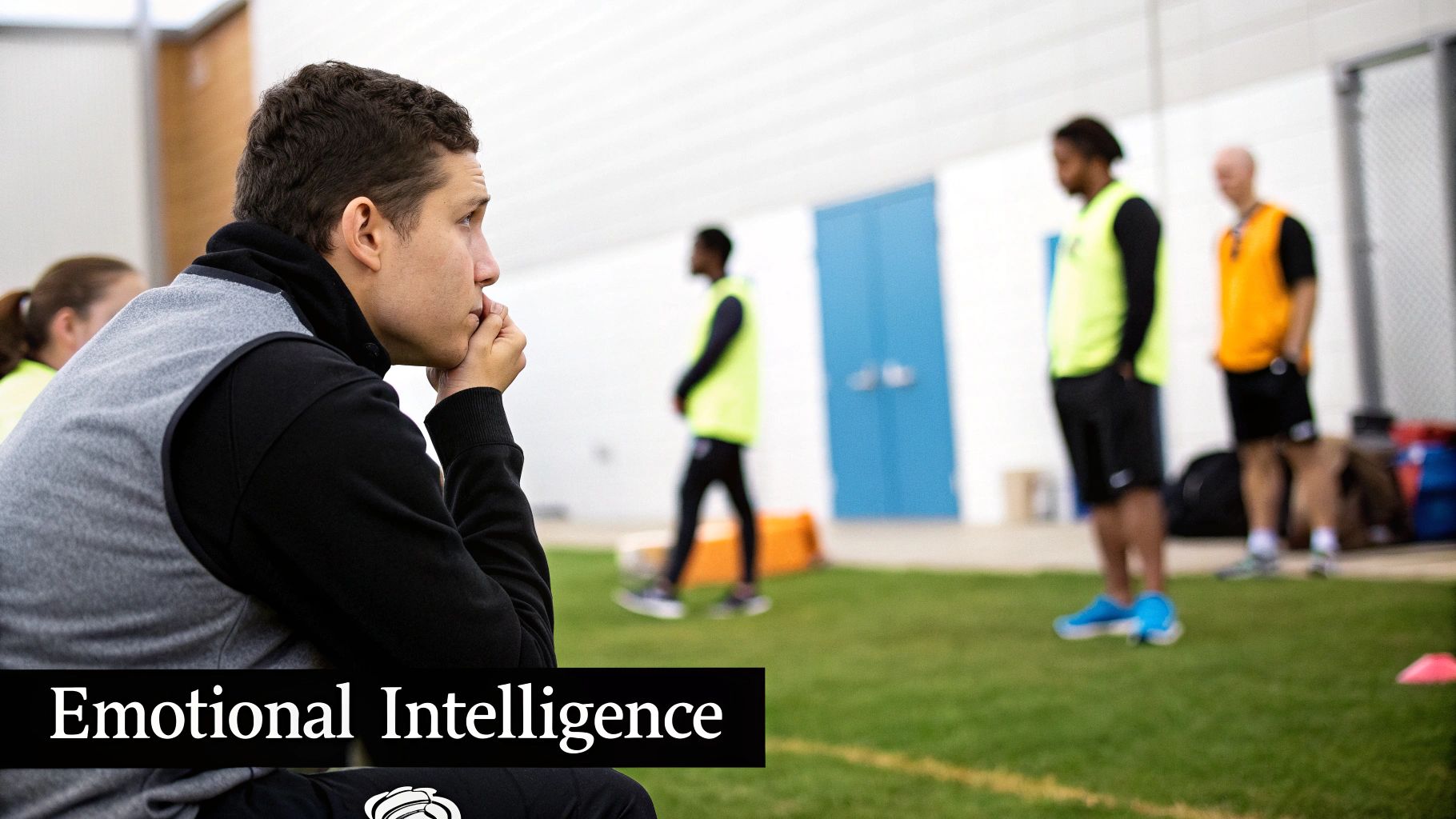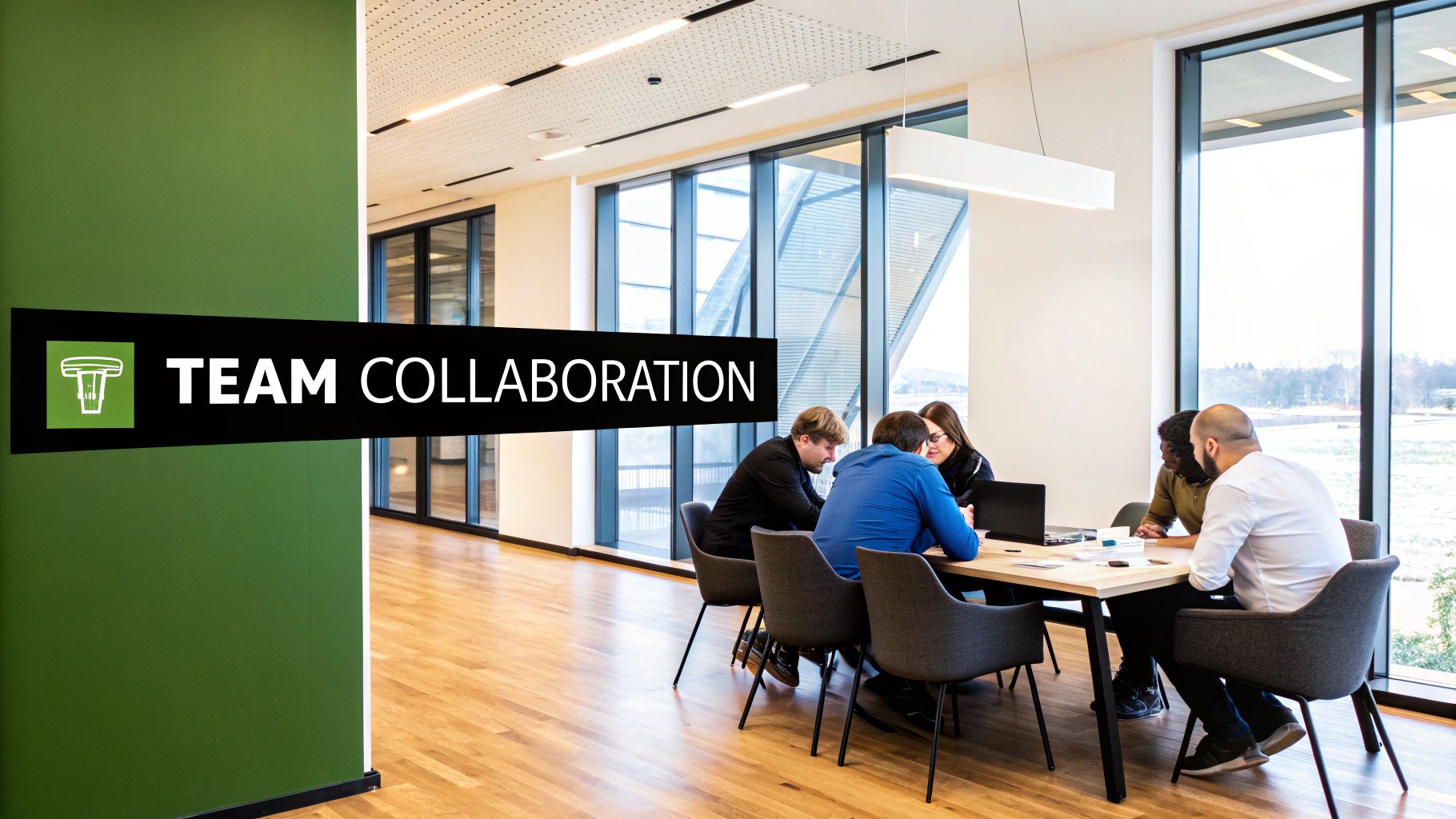
Soft Skills Training: Transform Your UAE Team for Success
Why Soft Skills Training Is Reshaping UAE Workplaces

The UAE's diverse business landscape requires a workforce with more than just technical skills. Strong interpersonal abilities are essential for navigating the complexities of this multicultural environment. This understanding is transforming how companies approach employee development, with soft skills training now considered a vital investment. For example, effective communication is key for working within multicultural teams, and adaptability is crucial in a constantly changing market. This means businesses are increasingly prioritizing investment in employees’ soft skills.
This shift is driven by the specific opportunities and challenges presented by the UAE’s unique economy. The multicultural nature of the business world demands professionals who can communicate effectively across cultures. Building strong relationships with colleagues and clients from diverse backgrounds is also crucial. Technical knowledge alone isn't enough to succeed in this nuanced environment. Soft skills training has therefore become a key driver of success in the region.
The Growing Importance of Soft Skills in the GCC Region
The focus on soft skills isn't limited to the UAE; it's a trend across the Gulf Cooperation Council (GCC). The soft skills training market in the GCC, including the UAE, was valued at US$ 570.5 million in 2023. Projections show it reaching US$ 1,566.9 million by 2032, growing at an annual rate of 11.88%. More detailed statistics can be found here. This growth is largely driven by companies investing in programs that focus on communication, teamwork, and problem-solving, especially in sectors like hospitality and healthcare. This demonstrates a regional commitment to developing a workforce equipped with essential interpersonal skills.
Furthermore, the post-pandemic environment has accelerated partnerships between industries and educational institutions. These collaborations aim to bridge skills gaps and prepare individuals for career growth and employment. In the UAE, this is especially relevant given the emphasis on attracting and retaining top talent in competitive sectors like finance and tourism. This strategic focus on skills development strengthens the UAE's commitment to a strong and flexible workforce.
Real-World Impact of Soft Skills Training in the UAE
Forward-thinking organizations in the UAE are seeing tangible benefits from prioritizing soft skills training. Companies investing in these programs report improvements in team dynamics, productivity, and customer satisfaction.
-
Improved Communication: Clear communication fosters understanding, minimizes misunderstandings, and builds stronger relationships both within teams and with clients.
-
Enhanced Collaboration: Strong teamwork enables more effective collaboration, allowing teams to leverage individual strengths and achieve common goals.
-
Increased Productivity: Effective time management, problem-solving, and decision-making skills contribute directly to improved productivity and efficiency.
These positive outcomes are motivating more UAE businesses to embrace soft skills training as a strategic investment. The focus is shifting from simply acquiring technical expertise to developing the interpersonal skills vital for success in today's dynamic business world. This proactive approach is shaping a more adaptable, collaborative, and successful workforce in the UAE.
Core Soft Skills That Drive Success in UAE's Diverse Economy

The previous section emphasized the increasing need for soft skills training within the region. This section explores the specific soft skills most relevant to the UAE's distinct business environment. These abilities are essential for successfully navigating a multicultural workplace and contributing to a thriving organization.
Essential Soft Skills for UAE Professionals
The diverse nature of the UAE's economy calls for a specialized set of soft skills. Cross-cultural communication, for example, is vital. With a significant expatriate population, understanding and respecting cultural nuances is essential for establishing strong professional relationships. This involves acknowledging the diverse communication styles, customs, and etiquette present in the workplace.
Emotional intelligence also plays a key role. This allows professionals to understand and manage their own emotions, as well as the emotions of others, promoting positive interactions and stronger teamwork, particularly within the hierarchical structures often found in UAE businesses.
Industry-Specific Soft Skills in the UAE
The value of certain soft skills can vary significantly across different sectors in the UAE. In the hospitality industry, for instance, empathy, patience, and active listening are crucial for delivering exceptional customer service. Conversely, the financial sector may prioritize negotiation, decision-making, and critical thinking for securing deals and managing complex financial matters. These industry-specific variations are important factors to consider when creating impactful soft skills training.
To better understand these nuances, let's look at a comparison of key soft skills across some prominent UAE industries. The following table highlights the most valuable soft skills in these sectors, helping you identify which competencies to prioritize.
High-Impact Soft Skills in Key UAE Industries
| Industry | Critical Soft Skills | Business Impact | Training Focus Areas |
|---|---|---|---|
| Hospitality | Empathy, Patience, Active Listening, Cross-cultural communication | Enhanced customer satisfaction, positive brand reputation, increased customer loyalty | Communication skills training, cultural sensitivity workshops, customer service best practices |
| Finance | Negotiation, Decision-Making, Critical Thinking, Problem-solving | Successful deal closures, effective risk management, sound financial strategies | Analytical skills development, negotiation tactics, problem-solving workshops |
| Construction | Teamwork, Communication, Problem-Solving, Adaptability | Efficient project completion, reduced errors and delays, strong team cohesion | Team building activities, conflict resolution strategies, communication skills training |
| Technology | Communication, Problem-solving, Creativity, Adaptability | Innovative product development, efficient project management, streamlined solutions | Design thinking workshops, Agile methodologies, communication and collaboration training |
This table illustrates how different sectors within the UAE require specific soft skills for optimal performance. Focusing training programs on these specific areas can significantly enhance the impact of soft skills development.
Adapting Soft Skills Training to Local Practices
Effective soft skills training in the UAE must be culturally sensitive. While global best practices offer a solid framework, adapting the content to align with local culture and values enhances its effectiveness. This includes incorporating Islamic business principles and acknowledging the influence of hierarchy on communication styles.
Using culturally relevant examples and scenarios within the training materials is also important. For example, direct expressions of leadership, common in some Western cultures, may be less effective than a more nuanced approach emphasizing collaboration and consensus-building in the UAE. These adaptations ensure the training is relevant and resonates with a diverse workforce.
Key Soft Skills for UAE's Workforce
- Communication: Clear and respectful communication tailored to diverse cultural contexts.
- Collaboration: Working effectively in diverse teams and valuing varied perspectives.
- Adaptability: Successfully navigating change and uncertainty within a dynamic business environment.
- Problem-solving: Employing critical thinking and developing creative solutions to complex issues.
- Leadership: Inspiring and motivating teams, finding a balance between authority and collaboration.
- Time Management: Effectively prioritizing tasks and managing workload in a fast-paced setting.
These represent some of the soft skills increasingly sought after by employers in the UAE. Investing in soft skills training programs helps individuals advance their careers and contributes to the overall growth and success of organizations within the UAE's dynamic and diverse marketplace.
Creating Culturally-Authentic Soft Skills Training Programs

Designing impactful soft skills training in the UAE requires a deep understanding of local culture and business practices. It's about creating relevant learning experiences that resonate with the diverse workforce. This involves incorporating cultural nuances into every aspect of the training, from the content and delivery methods to the examples and case studies used.
Integrating Islamic Business Principles and Contemporary Practices
Successful soft skills training programs in the UAE often blend contemporary leadership methodologies with Islamic business principles. These principles emphasize ethical conduct, fairness, and social responsibility, creating a strong foundation for professional development.
For example, concepts like Shura (consultation) can be integrated into training on teamwork and decision-making. This demonstrates how collaboration and consensus-building are valued in Islamic tradition, providing a culturally relevant framework for learning.
Additionally, incorporating the importance of relationships and trust, crucial in Arab culture, is key. This means emphasizing the significance of personal connections in professional interactions, particularly in communication and negotiation training. These cultural adaptations ensure the training aligns with UAE professionals' values.
Navigating Language Barriers and Cultural Nuances
Addressing language barriers is essential for effective soft skills training in the UAE. While English is common in business, offering training in Arabic can enhance comprehension and engagement, especially for those whose primary language isn't English. Simultaneous translation or bilingual materials ensures accessibility.
Understanding cultural sensitivities is also paramount. Adapting communication styles to respect hierarchical structures, common in UAE businesses, is crucial. The training should also address appropriate nonverbal communication, as gestures can have different meanings across cultures. This sensitivity ensures respectful training and avoids misunderstandings.
This investment in soft skills training reflects a global trend. The market is expected to reach USD 33.39 billion in 2024, with a projected annual growth rate of 11.40% through 2033. Find more detailed statistics here. This growth underscores the UAE's alignment with international best practices in talent development and highlights the growing recognition of soft skills' importance.
Blending Traditional Mentorship with Modern Delivery Systems
Many UAE organizations value traditional mentorship models, deeply rooted in Arab culture. Integrating these models into soft skills training creates a powerful learning experience. Pairing experienced professionals with newer employees offers personalized guidance and fosters strong professional relationships.
This traditional approach can be enhanced with modern digital delivery systems. Using online platforms and mobile learning tools increases flexibility and accessibility, reaching a wider audience. This blended approach combines mentorship's personalized benefits with technology's scalability and convenience, creating an effective and engaging learning experience.
Customizing Global Frameworks for UAE-Specific Experiences
While global best practices offer a valuable foundation, customizing soft skills training for the UAE is vital. This involves adapting case studies to reflect local business challenges and cultural contexts. For example, using examples from the hospitality industry or free zones creates a relatable learning experience.
Incorporating UAE success stories of effective soft skills training can be inspiring. Analyzing situations where cultural misunderstandings hindered success provides valuable learning opportunities. This approach grounds the training locally and promotes practical application, offering a roadmap for navigating the UAE's business environment.
Measuring What Matters: Proving Soft Skills Training ROI

Demonstrating the return on investment (ROI) of soft skills training requires more than just simple feedback forms. It involves linking improvements in interpersonal skills to tangible business outcomes. This connection is particularly important for executives in the UAE. Establishing clear metrics and tracking progress, from individual changes to overall organizational improvements, is essential.
Identifying Key Metrics in the UAE Business Context
In the competitive UAE market, certain metrics are especially relevant for gauging the impact of soft skills training. Employee retention, for instance, is a vital indicator. Lower turnover rates often suggest increased employee engagement and satisfaction, potentially stemming from improved communication and stronger workplace relationships fostered by the training.
Customer experience indicators, such as customer satisfaction scores and loyalty metrics, also reflect the effectiveness of soft skills training. Improved communication and empathy from customer-facing employees, developed through these programs, can directly influence these metrics. This highlights the link between internal training and external success.
Finally, connecting soft skills training to productivity enhancements offers concrete evidence of ROI. Tracking improvements in project completion rates or efficiency gains demonstrates the training’s practical impact on business operations. This data-driven approach provides compelling evidence for stakeholders.
Linking Soft Skills to Organizational Performance
Forward-thinking organizations in the UAE are directly correlating specific soft skills interventions with measurable results. These results include innovation outcomes and team effectiveness scores. This approach involves closely monitoring progress in areas like collaborative problem-solving and creative thinking. These improvements can contribute to more successful product development and more efficient processes. Such correlations illustrate how soft skills drive organizational growth.
For example, if a training program emphasizes teamwork and communication, measuring subsequent improvements in project completion times or a reduction in project conflicts directly links the training to positive business outcomes. This clearly demonstrates the tangible impact of soft skills.
Building a Comprehensive Measurement System
Developing a robust system for measuring soft skills training ROI requires tracking progress at various levels. This begins with observing individual behavioral change, such as improved communication in team meetings or the application of new problem-solving strategies. These individual changes lay the groundwork for measuring broader impact.
This progress then extends to team performance improvements, including increased collaboration and a more positive team dynamic. Ultimately, these team-level improvements connect to wider organizational performance indicators, demonstrating how individual skill development translates into overall business success. This multi-level approach showcases the ripple effect of training across the organization.
Communicating Value to Stakeholders
Effectively presenting data is a critical component of measuring ROI. Creating dashboards that visually represent the connection between soft skills training and business outcomes is crucial for communicating value to stakeholders. These dashboards should highlight key metrics, track progress, and clearly demonstrate the positive effects of the training.
A clear, concise presentation of this data can persuade even the most skeptical stakeholders. This not only justifies past investments but also builds support for future investment in soft skills development.
To understand the value and impact of soft skills training, let's examine a practical framework. The table below outlines a systematic approach to measuring ROI across different organizational levels and timeframes.
Soft Skills Training ROI Measurement Framework
| Measurement Area | Key Metrics | Data Collection Methods | Analysis Approach | Typical Timeframe |
|---|---|---|---|---|
| Individual | Improved communication, problem-solving, time management | Self-assessments, 360-degree feedback, observation | Pre- and post-training comparisons, qualitative feedback analysis | Short-term (3-6 months) |
| Team | Increased collaboration, reduced conflict, improved project completion rates | Team performance reviews, project data analysis, team surveys | Trend analysis, correlation with individual metrics | Mid-term (6-12 months) |
| Organization | Enhanced customer satisfaction, increased employee retention, improved productivity | Customer surveys, employee retention data, financial performance indicators | Statistical analysis, correlation with team and individual metrics | Long-term (12+ months) |
This framework offers a structured method for tracking progress and demonstrating the value of soft skills training within a UAE organization. These practical steps help solidify the relationship between investing in employees and achieving positive business outcomes. The National Academy (NAI) understands the importance of measuring ROI. Visit us to learn more about how our soft skills training programs can benefit your team and deliver tangible results.
Bridging Critical Skills Gaps in UAE's Competitive Market
The UAE’s dynamic economy presents unique workforce challenges. These challenges require specialized approaches to soft skills training. Understanding these challenges and implementing targeted training is crucial for success in this competitive market. This goes beyond traditional training and requires a more strategic approach to skills development.
Identifying Pressing Capability Gaps
Analyzing regional employment data and consulting with industry leaders reveals specific capability gaps. These gaps impact organizational performance in the UAE. They often extend beyond technical expertise, highlighting the growing importance of interpersonal skills in a multicultural business environment. Effective cross-cultural communication and collaboration are essential for success in the UAE's diverse workforce.
Forward-thinking companies are conducting thorough skills audits. These audits go further than traditional competency models. They delve deeper into interpersonal deficiencies affecting teams, pinpointing specific areas where training can have the biggest impact. This focused approach ensures resources are used effectively.
Aligning Development Programs with Emiratization Objectives
Aligning development programs with Emiratization objectives is essential. Emiratization is a key government initiative to increase Emirati nationals' participation in the private sector. Soft skills training equips Emirati professionals with the interpersonal abilities needed to thrive in leadership roles and contribute to the nation’s economic growth. This targeted development strengthens the local talent pool.
Developing capabilities across expatriate populations is also crucial for maintaining a balanced and skilled workforce. Soft skills training programs for expatriates can address specific challenges, such as navigating cultural differences and understanding local business practices. This inclusivity creates a stronger workforce.
While direct UAE data on soft skills training outcomes is limited, the GCC's labor market challenges offer insights. Pre-pandemic youth disengagement (not in employment, education, or training) in MENA was 30% in 2019. Learn more about this. Though this statistic covers a wider region, it highlights issues affecting the UAE. Private sector training initiatives aim to reduce these gaps. Corporate providers dominate GCC soft skills training, prioritizing communication and productivity. The UAE’s focus on tourism and finance aligns with the 11.88% annual market growth, driven by government support and employer demand.
Implementing Effective Needs Assessments
Practical frameworks for needs assessment are essential for effective training programs. These frameworks should consider the diverse cultural backgrounds, educational experiences, and career expectations in the UAE. This ensures training resonates with participants and addresses their development needs. Understanding the role of hierarchy in UAE business culture, for example, can inform leadership training programs.
Strategies for Rapid Capability Enhancement
Implementing training strategies that deliver rapid capability enhancement without disrupting operations is crucial. This involves using efficient methods like online learning platforms and blended learning approaches. This minimizes downtime and maximizes flexibility, allowing professionals to easily fit training into their schedules. The National Academy (NAI) offers flexible soft skills training tailored to the UAE market. Visit NAI to learn how we can help you bridge skills gaps and enhance your team’s performance.
Beyond Classrooms: Innovative Soft Skills Delivery Methods
The most effective soft skills training goes beyond traditional lectures and workshops. It aims to create engaging and memorable learning experiences. This section explores innovative methods delivering exceptional results in UAE organizations, blending modern technology with culturally relevant approaches to maximize impact.
Leveraging Technology for Enhanced Learning
Innovative companies in the UAE are using technology to elevate their soft skills training programs. Virtual Reality (VR) simulations, for example, allow employees to practice challenging conversations in a safe, controlled environment. This immersive experience builds confidence and improves communication skills.
Mobile microlearning delivers short, focused learning modules directly to employees' smartphones. This approach reinforces key concepts and allows for just-in-time learning, ideal for busy professionals. These bite-sized lessons are accessible anytime, anywhere, promoting continuous development.
AI-powered coaching provides personalized feedback and guidance at scale. This technology analyzes individual performance and offers tailored recommendations for improvement, ensuring training relevance and effectiveness.
Integrating Cultural Nuances into Training
Successful training programs in the UAE consider cultural context. Integrating Islamic mentorship principles with contemporary coaching techniques creates a resonant learning experience. This approach aligns with local values and fosters deeper understanding of effective communication and leadership.
Incorporating concepts of respect for elders and the importance of consensus-building into training programs enhances relevance for UAE professionals. This culturally sensitive approach maximizes engagement and overall impact.
Case Studies of Transformative Programs
Transformative soft skills training programs are emerging across various sectors in the UAE, from hospitality to finance. In the hospitality sector, VR simulations train staff on handling difficult customer interactions, improving customer satisfaction.
In the financial sector, AI-powered coaching platforms help financial advisors refine their communication skills, leading to stronger client relationships and increased client retention.
These real-world examples demonstrate the practical application of innovative training methods and their positive impact on business outcomes.
Adapting Delivery Methods to Specific Needs
Choosing the right delivery method depends on organizational context, audience needs, and business objectives. Mobile microlearning might be suitable for reinforcing sales techniques for a large, dispersed sales team. VR simulations might be more appropriate for practicing leadership skills within a management development program.
Consider factors like budget, available resources, and the specific soft skills being targeted. This ensures training aligns with organizational needs and maximizes ROI. By exploring and adapting these innovative methods, organizations in the UAE can create effective and engaging soft skills training experiences that drive lasting behavioral change and contribute to business success. The National Academy (NAI) offers a range of soft skills training programs tailored to the needs of UAE organizations. Visit NAI to explore how they can help your team develop essential interpersonal skills and achieve your business objectives.
The Future of Soft Skills Training in the UAE Landscape
The UAE's ambitious economic vision continues to push boundaries, requiring a workforce that's not only skilled but also adaptable and prepared for future challenges. This means soft skills training needs to evolve to meet these rising demands. This section explores the key factors shaping the future of workforce development in the region, from government initiatives to the impact of emerging technologies. This forward-looking perspective aims to help organizations understand and prepare for the crucial skills that will define success in the coming decade.
The UAE Vision and Workforce Development
The UAE's Vision initiatives, notably UAE Vision 2021 and UAE Centennial 2071, place a strong emphasis on innovation, economic diversification, and the development of a knowledge-based economy. These national strategies directly influence workforce development priorities. As a result, there's a growing demand for professionals proficient in critical thinking, problem-solving, and adaptability – core components of effective soft skills training. The national focus on entrepreneurship, for example, encourages programs that cultivate leadership, communication, and negotiation skills.
Technology's Impact on Training
Emerging technologies are transforming how soft skills are taught and learned. AI-powered personalized learning platforms, for example, can adapt training content to individual learning styles and pace. This personalized approach boosts engagement and significantly accelerates skill development. Furthermore, immersive learning experiences like virtual reality (VR) simulations offer a safe space to practice soft skills in realistic scenarios, which builds confidence and improves knowledge retention.
Shifting Demographics and Expectations
The UAE's evolving demographics and shifting workforce expectations also play a role in shaping training strategies. A younger, digitally native workforce expects engaging and interactive learning. This has led to the increased adoption of mobile learning platforms and gamified training programs. The growing number of women in the workforce also necessitates training programs that cater to their unique needs and challenges. Leadership development programs tailored for women, for instance, can provide the support and skills they need to excel in leadership roles.
Essential Skills for the Future Workforce
The skills needed for success in the UAE's future job market are constantly evolving. As automation becomes more widespread, uniquely human skills like creativity, emotional intelligence, and complex problem-solving are becoming increasingly valuable. The increasing focus on cross-cultural collaboration within the UAE's diverse business landscape further highlights the importance of strong communication skills and cultural sensitivity.
Preparing for Future Capabilities
Forward-thinking organizations in the UAE are proactively preparing for these shifting skill requirements. They are investing in comprehensive soft skills training programs that develop the capabilities crucial for maintaining a competitive edge in the years to come. These organizations recognize that investing in their workforce is a direct investment in their future success. They are also forging partnerships with training providers who offer innovative and culturally relevant programs. By proactively addressing the future of soft skills development, these organizations are positioning themselves for continued growth and success in the dynamic UAE landscape. The National Academy (NAI) understands these evolving needs. Visit NAI to explore how their tailored soft skills training programs can equip your team for the future of work in the UAE.